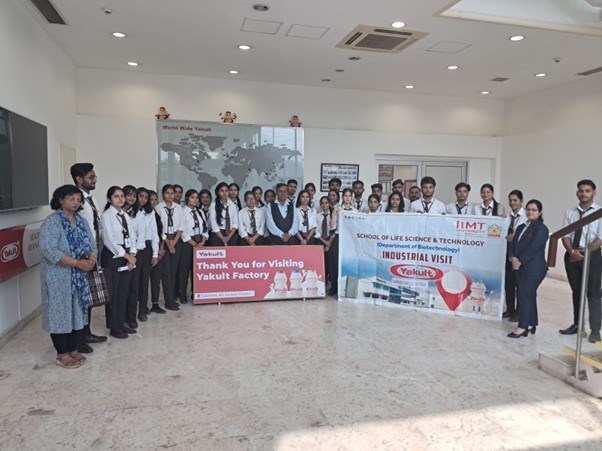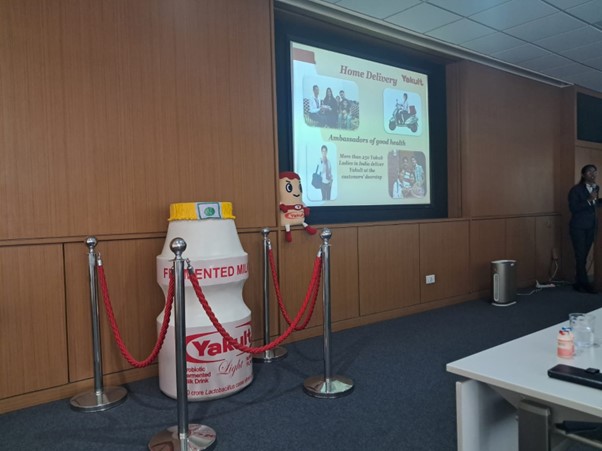Industrial Visit Report: School of Life Sciences & Technology, Department of Biotechnology
Industrial Visit to Yakult Danone India Pvt. Ltd.
Date of Visit: October 23, 2024
Location: Yakult Danone India Pvt. Ltd. Manufacturing Facility, Sonepat, Haryana
Objective of the Visit
Industrial visits are an integral part of academic training for students in biotechnology and related fields. Such visits offer a unique opportunity for students to observe real-world applications of the theoretical concepts they learn in classrooms. The visit to Yakult Danone India Pvt. Ltd. aimed to bridge the gap between academic knowledge and industry practices.
The visit to Yakult Danone India Pvt. Ltd. aimed to bridge the gap between academic knowledge and industry practices.
The primary objectives included:
- Gaining practical insights into biotechnology operations in a production environment.
- Understanding the significance of quality control, production processes, and innovative technologies.
- Observing the application of microbiological techniques and quality standards used in food biotechnology.
- Building industry connections for potential employment opportunities.
The visit also aimed to motivate students by exposing them to real-life working conditions, encouraging them to pursue excellence in their professional careers.

Importance of Industrial Visits in Biotechnology Education
Industrial visits are essential for providing a holistic learning experience. By observing real-world processes, students gain:
- Practical Understanding: Students witness how theoretical knowledge is implemented in a production setting.
- Skill Enhancement: Exposure to a professional environment hones students' interpersonal and technical skills.
- Industry Readiness: Students acquire familiarity with current trends and technologies, improving their employability.
- Relationship Building: These visits also allow students to establish relationships with industry professionals, which can be beneficial for future career opportunities.
Overview of Yakult Danone India Pvt. Ltd.
Yakult Danone India Pvt. Ltd. is a renowned producer of probiotic beverages, committed to enhancing human health through the development of scientifically formulated products. As a joint venture between Yakult Honsha (Japan) and Danone (France), the company is dedicated to delivering products that support digestive and immune health. Their production process is an excellent example of biotechnology in action, showcasing advanced microbiological techniques to ensure product quality and safety. Key Insights from the Visit The visit to Yakult’s facility provided a comprehensive view of biotechnology practices within the food industry. The main areas covered during the visit were:
- Introduction to Probiotic Production - Yakult focuses on Lactobacillus casei Shirota as the primary strain in its probiotic drinks, chosen for its proven health benefits. Students learned about the strain’s journey from lab research to large-scale production, underscoring the role of biotechnology in enhancing human health. Production Process The production process at Yakult is both systematic and rigorous, involving several stages:
- Fermentation: The probiotic strain is carefully cultivated under controlled conditions to maintain its viability and effectiveness.
- Blending: The fermented culture is mixed with other ingredients, following precise formulations.
- Bottling and Packaging: Advanced automated machinery ensures that each bottle is sealed in a sterile environment, preserving product quality and safety.
Students observed these stages and gained insight into the level of precision required for large-scale production of a biotechnological product. Quality Control and Assurance Yakult employs stringent quality control measures at each production stage. Students learned about microbial testing, safety checks, and product consistency assessments. They also observed how quality control laboratories perform regular testing to ensure compliance with food safety standards. Application of New Technologies Yakult integrates modern technology such as automated bottling lines, advanced fermentation equipment, and data analytics for quality tracking. These innovations enable the company to maintain high productivity while ensuring consistent quality in every batch of its products.
Sustainability and Waste Management
The visit highlighted Yakult’s commitment to environmental sustainability. They use eco-friendly materials for packaging and have implemented waste management practices to minimize environmental impact. Students learned about the importance of sustainable practices in the biotech industry, aligning with global standards for responsible manufacturing.
Outcomes of the Industrial Visit
The visit to Yakult Danone India Pvt. Ltd. provided students with valuable insights and experiences that enhanced their academic and professional competencies. The key outcomes were as follows: 1. Acquisition of Practical Knowledge By observing the production process firsthand, students gained an understanding of how theoretical knowledge is applied in a real-world setting. They witnessed the operational intricacies of a biotechnological product's lifecycle, from fermentation to quality testing. 2. Understanding Business Operations Students were exposed to various business functions within the facility, such as marketing, finance, production, and customer relations. This exposure offered them a clearer picture of how different departments interact to achieve organizational objectives. 3. Familiarity with Current Market Trends The biotech industry is rapidly evolving, and Yakult's focus on health and wellness aligns with current market demands. Students gained insights into the significance of consumer trends in product development and the strategic role of innovation in maintaining a competitive edge. 4. Exposure to Emerging Technologies Yakult’s facility utilizes cutting-edge technology to streamline production and quality control. Students were introduced to the latest advancements in microbial testing, automated packaging, and data monitoring systems. Understanding these technologies can enhance their competencies, making them more adaptable to industry needs. 5. Building Professional Relationships Industrial visits encourage students to establish connections within the industry. Engaging with Yakult professionals offered them an opportunity to ask questions, receive career advice, and understand the skills required in the field. These connections may be beneficial for internships or job placements after graduation. 6. Development of Interpersonal Skills The visit encouraged students to work collaboratively, ask insightful questions, and improve their communication skills. The experience enhanced their ability to engage in discussions, present ideas, and interact professionally with industry experts, preparing them for future employment.


The industrial visit to Yakult Danone India Pvt. Ltd. was a highly educational experience that complemented the students' academic learning. Observing the practical application of biotechnology principles in probiotic production helped bridge the gap between classroom theories and real-world practices. By gaining exposure to advanced technologies, quality control methods, and sustainability practices, students are now better equipped to pursue careers in the biotech industry. Overall, the visit fostered a sense of motivation and curiosity among the students, encouraging them to pursue excellence in biotechnology and related fields. As they continue their studies, these experiences will be invaluable in shaping their understanding of the industry and enhancing their professional skills. For students and educational institutions, industrial visits like these are essential in developing future-ready professionals capable of contributing to innovative advancements in biotechnology.
23-Oct-2024
Back


